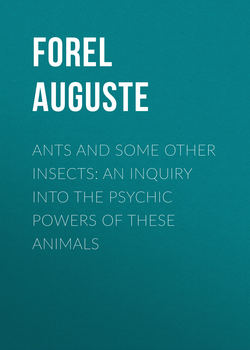Ants and Some Other Insects: An Inquiry Into the Psychic Powers of These Animals

Реклама. ООО «ЛитРес», ИНН: 7719571260.
Оглавление
Forel Auguste. Ants and Some Other Insects: An Inquiry Into the Psychic Powers of These Animals
ANTS AND SOME OTHER INSECTS
THE PROVINCE OF COGNITION
THE REALM OF WILL
THE REALM OF FEELING
PSYCHIC CORRELATIONS
APPENDIX. THE PECULIARITIES OF THE OLFACTORY SENSE IN INSECTS
Отрывок из книги
When discussing the ant-mind, we must consider that these small animals, on the one hand, differ very widely from ourselves in organisation, but on the other hand, have come, through so-called convergence, to possess in the form of a social commonwealth a peculiar relationship to us. My subject, however, requires the discussion of so many complicated questions that I am compelled to assume acquaintance with the work of others, especially the elements of psychology, and in addition the works of P. Huber, Wasmann, von Buttel-Reepen, Darwin, Romanes, Lubbock, my Fourmis de la Suisse, and many others. Since the functions of the sense-organs constitute the basis of comparative psychology, I must also refer to a series of articles entitled “Sensations des Insectes” which I have recently published (1900-1901) in the Rivista de Biologia Generale, edited by Dr. P. Celesia. In these papers I have defined my position with respect to various authors, especially Plateau and Bethe.
Very recently Bethe, Uexkull, and others have denied the existence of psychic powers in invertebrate animals. They explain the latter as reflex-machines, and take their stand on the ground of the so-called psycho-physical parallelism for the purpose of demonstrating our inability to recognise mental qualities in these animals. They believe, however, that they can prove the mechanical regularity of behavior, but assume unknown forces whenever they are left in the lurch in their explanations. They regard the mind as first making its appearance in the vertebrates, whereas the old Cartesians regarded all animals, in contradistinction to man, as mindless (unconscious) machines.
.....
On this account I speak of monistic identity and not of psycho-physical parallelism. A thing cannot be parallel with itself. Of course, psychologists of the modern school, when they make use of this term, desire merely to designate a supposed parallelism of phenomena without prejudice either to monism or dualism. Since, however, many central nervous processes are accessible neither to physiological nor to psychological observation, the phenomena accessible to us through these two methods of investigation are not in the least parallel, but separated from one another very unequally by intermediate processes. Moreover, inasmuch as the dualistic hypothesis is scientifically untenable, it is altogether proper to start out from the hypothesis of identity.
It is as clear as day that the same activity in the nervous system of an animal, or even in my own nervous system, observed by myself, first by means of physiological methods from without, and second, as reflecting itself in my consciousness, must appear to me to be totally different, and it would indeed be labor lost to try to convert the physiological into psychological qualities or vice versa. We cannot even convert one psychological quality into another, so far as the reality symbolised by both is concerned; e. g., the tone, the visual and tactile sensation, which a uniform, low, tuning-fork vibration produces on our three corresponding senses. Nevertheless, we may infer inductively that it is the same reality, the same vibration which is symbolised for us in these three qualitatively and totally different modes i. e., produces in us these three different psychical impressions which cannot be transformed into one another. These impressions depend on activities in different parts of the brain and are, of course, as such actually different from one another in the brain. We speak of psycho-physiological identity only when we mean, on the one hand, the cortical neurocyme which directly conditions the conscious phenomena known to us, on the other hand, the corresponding phenomena of consciousness.
.....